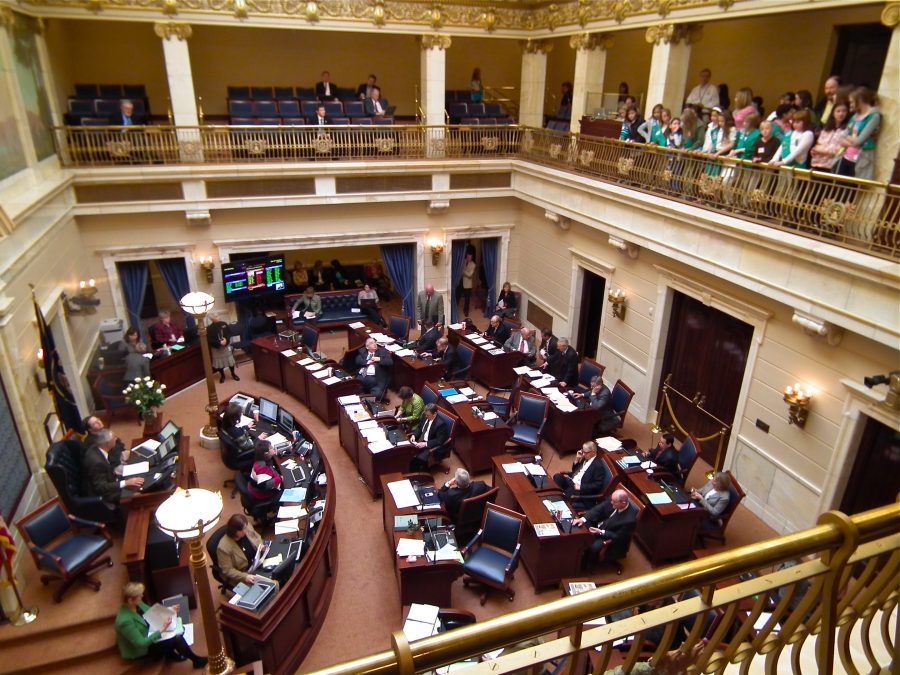Edwards: Prop Four Can Reduce Gerrymandering Problems. Utah Legislators Should Keep It As Is.
Girl Scouts visit the Utah State Legislature. Courtesy Wikimedia Commons.
July 28, 2019
Last November, Utah voters passed three ballot initiatives, one of which was Proposition Four — an anti-gerrymandering initiative that establishes an independent redistricting commission to propose district boundaries for the 2021 redistricting cycle. Gerrymandering is the manipulation of an electoral district — and therefore the electoral constituency — in order to favor one demographic group over another.
For over 20 years, the Supreme Court has held that racial gerrymandering is unconstitutional. But in late June of this year, the Supreme Court held in Rucho v. Common Cause that questions of partisan gerrymandering are non-justiciable political questions that cannot be dealt with by the federal court system.
Numerous voting rights organizations including the ACLU, Brennan Center for Justice, Campaign Legal Center, Common Cause and Let America Vote have decried the Supreme Court’s decision on Rucho v. Common Cause as a blow to the advancement of voting rights and democratic governance. Justice Kagan expressed similar opinions in her brilliantly written dissenting opinion that dismantled not only the questionable reasoning behind the Court’s majority opinion, but also the most commonly used arguments sympathetic towards gerrymandering.
Yet, the problem of partisan gerrymandering remains. If partisan gerrymandering continues unchecked, it may, in the words of Justice Kagan, “irreparably damage our system of government.” And rather than reiterate the practical, theoretical and legal arguments against gerrymandering already laid out in Justice Kagan’s dissenting opinion, the most necessary question we must ask ourselves following the Court’s decision is what’s next.
There are multiple viable options to choose from going forward, all of which have limitations. But building on continued public support for fair redistricting despite imperfections is better than wallowing in self-pity and lamenting the destruction of democratic principles. Relief from partisan gerrymandering can still be sought through the court system, but because of the Rucho v. Common Cause decision, voting rights advocates will have to turn to state courts. State courts can overturn existing boundaries and order redrawn maps, which has already happened in Pennsylvania and Florida, but of course some courts will refuse to do so.
Citizens in states with constitutional or statutory provisions for ballot initiatives can propose an independent redistricting commission on the ballot. Independent redistricting commissions have passed successfully in Utah as well as Michigan, Missouri and Colorado, and these independent redistricting commissions have been proven to reduce partisan disparities in redistricting.
But most states do not have an initiative process, and even if they do, many states require initiatives to first go through the state’s legislature. Even after a ballot initiative passes, it can be amended, modified or gutted by the state legislature, which the Utah Legislature showed a troubling propensity for in the last year.
Some states, like New Hampshire and California, have created independent redistricting commissions via the legislature, but this cannot be the expectation going forward. Many state legislators will be hesitant to give up the ability to accumulate more power for their party or protect themselves from a certain challenger during an election. These limitations make it even more necessary that the Utah Legislature does not alter Proposition Four prior to the 2021 redistricting cycle without working in partnership with and receiving the endorsement of the Better Boundaries Campaign.
On the national level, legislation has been proposed on numerous occasions, most notably H.R. 1, the House Democrats’ anti-corruption and electoral reform bill. Among many different reforms, H.R. 1 proposes that all states use independent redistricting commissions during congressional redistricting. The likelihood of the Senate ever passing a bill like H.R. 1 while Majority Leader Mitch McConnell stays in power is virtually zero, as he has already described H.R. 1 as a “blatant power grab.”
Senator McConnell’s comments on H.R. 1 echo a common argument against anti-gerrymandering legislation in general — that its proponents only want to elect more members of the [insert opposing political party] during the next election cycle. In some respects, this sentiment is true. It is likely that if fairer maps are drawn in 2021, more Democrats will be elected in Utah. But it is also likely that if fairer maps are drawn in 2021, more Republicans will be elected in Maryland. Combating partisan gerrymandering is not a partisan issue — there is overwhelming bipartisan disdain for partisan gerrymandering and support for independent redistricting commissions.
And while some people may support anti-gerrymandering legislation because it’s in their own self-interest, many people do not. In fact, some of the most visible leaders in the fight against gerrymandering are people who benefit from the status quo. Congressman John Sarbanes represents Maryland’s 3rd Congressional District, one of the most gerrymandered districts in the country, and he is the primary sponsor of H.R. 1. The Better Boundaries campaign for Proposition Four was lead by two Republicans and two Democrats.
There are certainly provisions of Proposition Four that could possibly use improving — conservative Utah Legislators will be the first to remind constituents that legislating via ballot initiative is not a perfect process. But the Utah Legislature has a responsibility to do their part in reducing the corrosive practice of partisan gerrymandering and the best way to do this is by maintaining the integrity of Proposition Four prior to redistricting in 2021.








